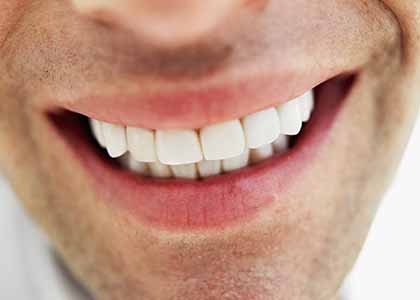Indianapolis patients can restore their smiles with dental crowns
Dental crowns, also called caps, are artificial teeth that have been used since the late 1800s when the first porcelain crown was patented. Over the years, a variety of materials and improvements have helped dental crowns evolve. Porcelain-fused-to-metal resolved early problems with stress-fractures and cracking of the porcelain. All-ceramic crowns reemerged in the 1960s, followed by glass-reinforced crowns. Other materials that have been used include zirconia, lithium, stainless steel, resin, leucite, and gold.
Today, many dentists prefer high-quality ceramic or porcelain overlays on metal bases because of the cosmetic effects. Gold is still used because of its strength, particularly for molars in the back of the mouth.

Dental crowns can protect, restore, or cover teeth that are weakened, cracked, worn down, unattractive, misshapen, badly stained, or have a large filling. Crowns are also an important component of other restorations, including dental bridges and implants.
Dr. Matthew Church and our experienced team at Washington Street Dentistry serve patients and families from Indianapolis, East Indianapolis, Lawrence, Anderson, New Palestine, Cumberland, Greenfield, and surrounding Indiana communities. We offer a complete array of pediatric, family, cosmetic, restorative, preventive, surgical, sedation, and emergency dentistry, as well as treatment for gum disease, root canal, sleep apnea, and alignment issues.
The process for receiving a dental crown is easy, and is usually completed in a few visits to our comfortable and welcoming office. The steps include:
- Comprehensive consultation with Dr. Church to determine if a patient is an ideal candidate for the procedure
- Examination and taking digital images of the roots of the tooth and bone structure. In the event of infected or extensive damage, a root canal treatment may be recommended
- Preparation for the crown, which involves reducing the sides and surface of the tooth to make room for the crown
- A tooth that has excessive decay may need to be build up and reinforced to support the cap
- Impressions are made to ensure that a patient’s bite is not adversely affected. The impression is sent to a professional laboratory for custom milling
- For porcelain or ceramic restorations, Dr. Church and the patient choose the best shade of material to match surrounding teeth
- A provisional crown is placed to protect the tooth and is adhered with temporary cement
- Once received from the laboratory, the permanent crown is fitted, tested, and bonded into place
To learn more about long-lasting and natural-looking dental crowns, contact our team at Washington Street Dentistry at (317) 333-6788 today.
Share this Article
Back to Crowns and Bridges Page





